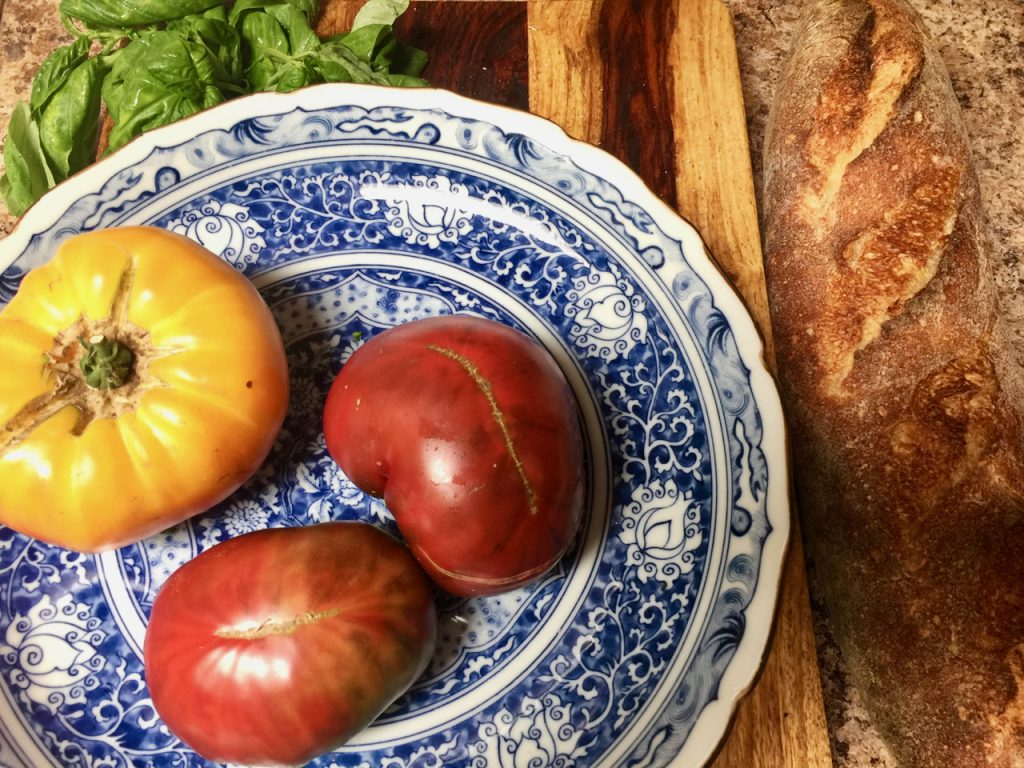
This originally appeared as part of the Daily Sip, a website from the Rev Charles LaFond, an Episcopal Priest who raises money for the homeless and lives on a horse farm in New Mexico with his dog Kai. offering daily meditations and reflections
Tomatoes, the last of the summer, are making their way into our kitchens like the last warriors coming home from battle or the last runners ending their race. Not early, but alive, dirty, tired and very well indeed. Still, even as the crisp night air whispers winter, there is hot bread, warm olive oil, the sliced tomato with basil, salt and pepper. And a glass of house wine – cheap, red, syrupy, soothing. The last tomatoes of summer are like the epilogue of a good TV show – the wrap up which pulls what has been seen together and sets up the tension for the next episode.
As I enter the epilogue of my life, I am noticing how important mornings are. They were always important, but now more than ever. I get to my chair on the porch in the darkness of 3:30 or 4:00 am like a keen opera-lover getting to the opera-house early for the best seat; with good coffee laden with heavy cream and agave syrup. I sit in the darkness with Kai; perched, ready for the show in its three movements. The first movement is from 4:00 to 5:00 am when there is utter silence, darkness and chill. My long Jellaba with its thick felt and heavy hood keeps me warm and I listen to the silence of pitch blackness, willing to sit with yesterday’s failures, but only for a few minutes. Then I need to let them go the way we let go of the rope tied to a sinking ship.
The next act in the drama of morning-sits is 5:00 – 6:00 am when the roosters begin their announcement that all shall be well in this new day. This is when regrets need to exit stage-left. The bulk of the crowing lasts only about 8 minutes from 5:00-5:08 though there will be a reprise…a second chorus at 5:30 and the occasional outlier. They seem to have a code, the roosters – we call together at 5:00 – then it’s every cock for itself! Then the darkness of Fall’s light-economy turns back to silent darkness – to waiting.
But no longer are we waiting to get through our griefs and resentments. No. They are back-stage in the green-room eating junk food, chain-smoking and calling their agents begging for more time on-stage. This second hour is for sitting between resentments and hope – that night-vestibule when we are willing just to be. It seems that it is at that time – sometime along in there, that God becomes easier to sense, lurking within that which is alive – the trees, the alfalfa field (still dark but throbbing a few feet away) and the canal just beyond the apple orchard. And the apples. God lurks as on a street corner waiting for us to turn and look- a little shy, aware she might get hurt, used, abused – but willing to wink and start a conversation.
And then there is 6:00 -7:00 am when the light begins to show a ribbon of pinkish blue on the horizon and the moon sets to make way for the sun – another day and a time for hope. Perhaps today I will not be hurt as I have been before. Perhaps today I will not hurt others either. Perhaps today I will be mindful, thoughtful, and aware of my suffering only so that it metabolizes into something useful. That third hour is there to play host to knowledge, understanding and the compassion we will need for ourselves and others.
To cut into the last tomatoes of the season, to bite into the crusty bread with olive oil and salt and a bit of the last basil – with wine in the evening or coffee in the morning – is to have just enough. It is our “daily bread” and it is a time – a middle-earth- when God seems to whisper encouragement: “…let go of the resentments, they are idiots. Do not water that seed. Do not bite that hook. Stay with now…the roosters…they are chanting the day’s introit. Stay with me. Wait here with me. A new day. Water the seeds of compassion and I will warm them to growth. Just today.”
Sure. Bread and wine, hymns, candlesticks and altars have their place perhaps, on Sundays, and for people over 50. But a new dawning is coming. The next generations are finding God in orchards and supper-clubs more than churches. In a tomato more than a stale, round, flavorless wafer. What shall we make of that? How shall we comfort the clergy anxiety? How shall we soothe their fears? What shall we make of this new day?

